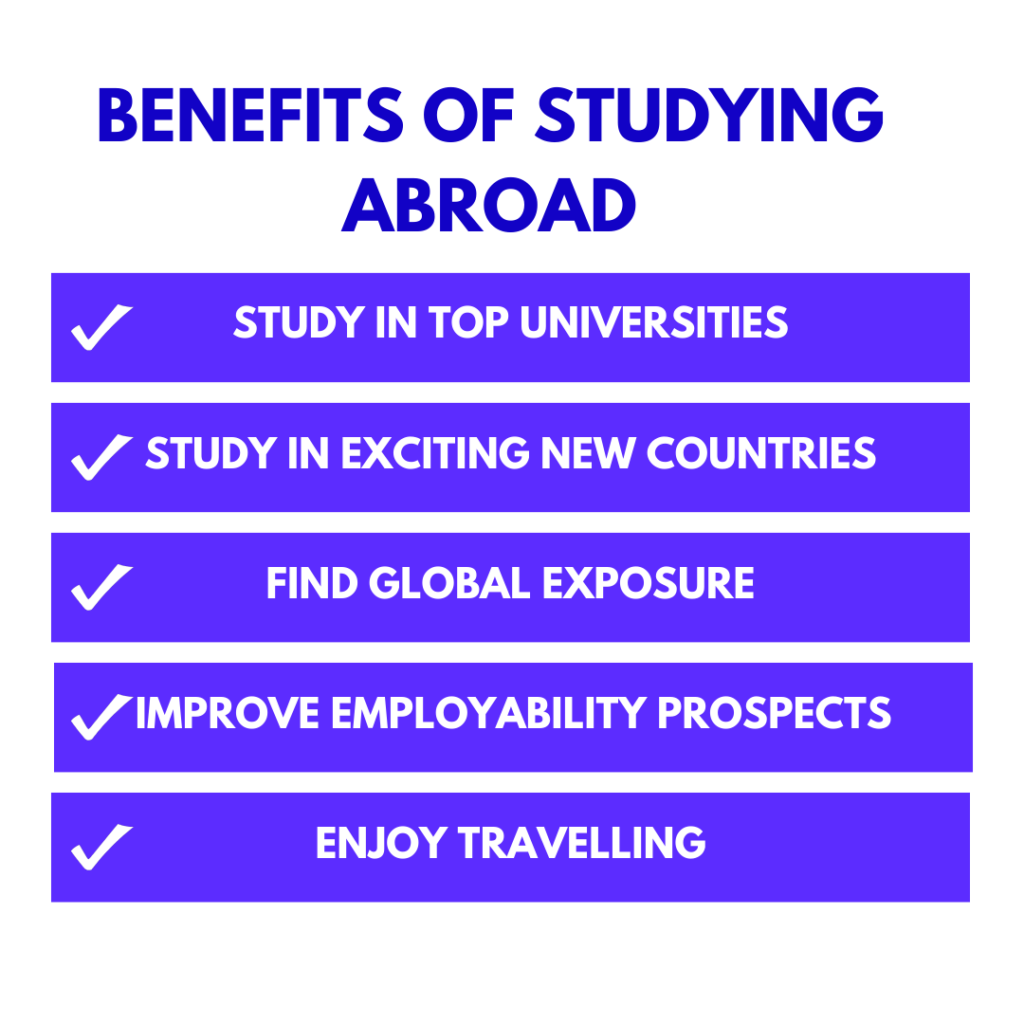If you just graduated or are about to, you may have witnessed the growing trend of studying abroad among your friends and classmates.
Post the pandemic, Indian students have shited greatly towards studying abroad. Around 8L Indian students moved abroad to pursue higher education in 2023, and this number is only expected to multiply in the coming years.
Have you wondered why all your friends are moving abroad for studies? What are the benefits of studying abroad? Of course, the most common reason is the boost in employment opportunities.
Research confirms that getting a master’s degree makes finding well-paying jobs in good companies easier. Plus, learning at top universities makes your degree more valuable. Countries like the USA, UK, Canada, Australia, and Ireland have some of the best universities in the world, naturally attracting millions of students every year.
However, all this is just the tip of the iceberg, as studying abroad has many perks. In this blog, we’ll discuss all the benefits of studying abroad.
Crack IELTS in 4 Weeks! IELTS 8 Band Guarantee

Ace IELTS with Band Guarantee. Get access to Live Classes & 100+ Mock Test. Join Free IELTS Masterclass Now!
Crack IELTS in 4 Weeks! IELTS 8 Band Guarantee
Ace IELTS with Band Guarantee. Get access to Live Classes & 100+ Mock Test. Join Free IELTS Masterclass Now!

Top 5 Benefits of Studying Abroad in 2024
Let’s get the basics out of the way. There are many obvious benefits of studying abroad, which is why most students are attracted to the trend. Some of them include:

Become a Part of World’s Top Universities 👩🎓👨🎓
We’ve grown up watching and hearing stories about big-gun universities such as Harvard, Stanford, or Oxford. The reality is that only a small percentage of students get into these universities, and the acceptance rates can be as low as 4%.
The good news is countless other universities are equally awesome! Some of the best traits these universities have are:
- Broader course range: Each degree has tens of available specialisations, allowing you to determine what interests you. In addition, countries like the USA provide flexibility by allowing you to explore different disciplines before you settle on a major.
- Interactive teaching and learning methods: Classrooms are smaller, allowing faculty to focus on each student. It’s easy to freely interact with lecturers, ask questions during lessons, and clarify doubts.
- Affordability: Though this does not apply to all universities, some in the UK, Canada, and Ireland offer exceptional courses at low costs. There’s also the added advantage of scholarships. Most universities have a scholarship program to aid international students.
- Employment outcomes: The majority of universities abroad have industry links. Finding employment opportunities (internships, volunteering opportunities, and possibly full-time roles) is easier. Over 80% of students from abroad universities (top-ranking and mid-ranking) find a job within just 6 months of graduation.
Study in World’s Best Destinations for Education 🗺️📍
The advantages of studying abroad do not begin and end with just the ‘study’ part. Don’t believe us? Here are some fast facts:
- Did you know you can complete your entire master’s education in just 1 year while touring some of the best countries in the world? That’s what studying in the UK looks like for most students!
- Have you heard? Some scholarships in the USA pay for your entire tuition and provide stipends for your living expenses.
- Did you know studying in Ireland lets you explore all of Europe visa-free?
- Most German universities (public universities) let you study completely free of cost!
- Just a 5.5 in IELTS is enough to get into many universities in Canada.
- Did you know that 6 of Australia’s universities have been featured among the top 100 universities in the world?
Global Exposure 🌏💻
Studying in an environment filled with students from all over the world gives you a unique experience. Honestly, you have to live it to understand it fully. But in a gist, this is how it feels:
- Talking to people from diverse backgrounds is a great way to understand various cultures and perspectives
- Moving to a completely strange land means cultural immersion, which helps you develop a global perspective and opinions
- Living in a different country helps you understand global challenges. It is your chance to get a firsthand experience on different topics such as politics, societal norms, and economics.
Skill Development + Improved Employability Prospects 🏢💼
Most universities abroad believe in an all-rounded education. This means your curriculum does not just focus on theory but also on effectively using that knowledge in practical situations. Therefore, universities greatly emphasise helping you develop skills beyond your course.
For instance, most Canadian universities offer co-op courses with industrial experience as part of the curriculum. This means that you will work with the university’s industry partners for some part of the course to gain hands-on experience. This also means you will have a few months of experience on your resume even before you graduate!
There’s also an emphasis on learning English since most study destinations are English-speaking nations. Universities mandatorily request for English proficiency scores such as IELTS or TOEFL. This allows you to hone your English skills, and with continuous use of the language (after moving abroad), you’ll be as good as a native English speaker.
Employers highly prefer employees who have studied abroad. Most people who study abroad naturally develop some of the strongest leadership skills.
Here are some examples:
- Improved Communication: Moving to an unfamiliar place encourages you to communicate (and sometimes overcommunicate) to make connections, engage in social activities, and manage daily tasks. This improves your communication skills.
- Improve language skills: In an English-speaking environment, you’ll converse primarily in English, significantly improving fluency and proficiency.
- Adaptability: Thriving amidst change is not as easy as it looks. It’s brave to form a life for yourself in an unknown land far away from your place.
- Resilience: Studying abroad and living alone forces you to tackle all challenges independently.
Travelling the World 🧳✈️
The best advantage of studying abroad is probably this! How can you refuse yourself the privilege of wandering through the lanes of a completely different world?
Popular study destinations such as the USA, UK, Ireland, Canada, and Australia are famous for their tourist attractions. These countries offer much to explore, including scenic destinations, historic landmarks, and cultural heritage.
Most study destinations are well connected by public transport and do not cost much. The average cost of using public transport is between 80-500 INR (minimum fare).
Living in another country also means you get to taste world-class cuisines. If you’re a foodie, you can have the time of your life!
How to Study Abroad?
If you plan on studying abroad, the first thing you’ll need to do is RESEARCH! If you’re on this blog, you’ve already started the process.
The process of studying abroad involves plenty of decision-making. You must choose a country, university, accommodation options, and more!
Planning your study abroad journey will take months, and if you’re serious about it, start the process at least a year before your intake. Here are some tips for you:
Choosing the right country
Read thoroughly about all good study destinations before you select one. You can shortlist the countries based on your budget, the course you’re interested in, and university compatibility.
Honestly, your options are endless. But these are a few countries to add to the list:
Choosing the right university
Once you’ve decided on the country, look for good universities there. Typically, universities accept students in three intakes: September, January, and May. This may vary depending on the country you choose.
It’s ideal to opt for the September intake as it’s the primary intake in most countries. Look for universities that are open for the intake you’re interested in. A good university shortlist should contain a mix of universities.
Firstly, look for universities you’re 100% compatible with. Once you have a few names in the list, add a couple of universities you’re 70-80% compatible with. Then, get more ambitious and add a few top universities to the list. You can determine the compatibility by looking at the university’s admission requirements.
Here are popular universities for most famous study destinations:
Popular Universities in the USA
| University | Annual Tuition fee in INR |
| Stanford University | 25-52L |
| Bridgewater State University | 7L-17L |
| University of Oregon | 16L |
| University of Michigan-Dearborn | 12L-21L |
| Boston University | 27L-50L |
| Western Illinois University | 6L-10L |
| University of Central Missouri | 7L-9L |
| Illinois State University | 11L-17L |
| Cleveland State University | 10L-15L |
| Lamar University | 15L-17L |
| University of North Texas | 28L |
Popular Universities in UK
| University | Average Tuition Fee Range (INR) |
| Queen Mary University of London | 10L – 57L |
| University of Liverpool | 18L |
| Kingston University | 17L – 25L |
| University of Derby | 16L |
| Edinburgh Napier University | 13L – 15L |
| Brunel University | 18L – 22L |
| Oxford Brookes University | 13L |
| University of Brighton | 13L – 18L |
| University of Bedfordshire | 12L – 19L |
| London Metropolitan University | 11L – 19L |
Popular Universities in Canada
| University | Annual Tuition Fee (INR) |
| University of Ottawa | 21L |
| Mount Saint Vincent University | 34L |
| Centennial College | 24L |
| McGill University | 47L |
| Douglas College | 16L |
| Carleton University | 36L |
| Queen’s University | 23L |
| Lambton College | 21L |
Popular Universities in Germany
| University | Tuition Fee |
| Technical University of Munich (TUM) | 1L-5L per year + Semester fee (varies depending on campus) |
| Freie University of Berlin | 28K per semester (Administrative charge) |
| RWTH Aachen University | 29K per semester (Administrative charge) |
| Karlsruhe Institute of Technology (KIT) | 1L-1.3L per semester |
| Humboldt University of Berlin | 26k per semester (Administrative charge) |
| Technical University in Berlin | 10k per semester (Administrative charge) |
| University of Hamburg | 31k per semester (Administrative charge) |
| TU Dresden | 24k per semester (Administrative charge) |
| University of Stuttgart | 1.3L |
| University of Leipzig | 24k-26k per semester (Administrative charge) |
Gather Documents & Apply!
Once you have shortlisted universities, go ahead and apply to them. Make sure you do it well ahead of the deadline. Universities appreciate early applications. Plus, you’ll have enough time to make other decisions and apply for a visa.
To successfully apply, you’ll have to gather documents such as:
- Academic Transcripts
- English Proficiency Scores
- Entrance Exam Scores
- Statement of Purpose
- Letter of Recommendation
- Financial Proof
Once you have applied to universities, track your application regularly. Typically, universities respond back quickly and provide a timely update regarding the status of your application. You can contact the admissions office if you’re in doubt.
Though this process may seem overwhelming at first, it will feel so worth it once you receive a confirmation from the universities!
Take a moment to imagine yourself holding an acceptance letter from your dream university. What a moment it’ll be! 🏆
Here’s a secret: Lakhs of students have found it easier to complete this entire process in an easy, hassle-free way. The trick is to plan your study abroad journey with LeapScholar. We love making your journey to study abroad easy! Starting from a solid university shortlist to securing a visa (and everything in between), we help you every step of the way!
Book a free call with us today and find out more! 📱
Summing Up
As we’ve established, there are several advantages of studying abroad. The interest in this trend is continuing to grow; by 2025, there will be over 1-2M Indian students studying abroad.
However, we want to emphasise that studying abroad is not a cakewalk. It requires continuous effort and dedication. You must show strong willpower, take life as it comes, and make something great out of it.
The best thing is, it will be worth it. 💓
Join the community, and see for yourself.
Frequently Asked Questions
-
Q. What are the basic requirements for Indian students to study in the USA?
A. The requirements for studying in the USA will vary depending on which course you’re applying to and the university you want to get into. You should have completed your secondary education (12 years of schooling). Universities will have their academic requirements, which you must meet. You will also need to take standardised tests such as the SAT or ACT for undergraduate programs or the GRE/GMAT for graduate programs. English proficiency tests such as IELTS are also mandatory for the USA.
-
Q. Which visa do you need to study in the USA?
A. You will need an F1 visa to study in the USA. You can apply for the visa once you receive an acceptance letter from your desired university. The visa process takes 2-3 months, so it’s best to apply to universities early just so you can kickstart your visa process in time.
-
Q. Can I work part-time while studying in the UK as an Indian student?
A. Yes, Indian students studying in the UK on a Tier 4 student visa are generally allowed to work part-time during term-time (up to 20 hours per week) and full-time during holidays. This is one of the best benefits of studying abroad. Working part-time is a great opportunity to make some money on the side. Plus, it adds to your overall profile.
-
Q. What is the duration of courses in the UK?
A. One of the main benefits of studying abroad in the UK is the duration of its courses. While undergraduate courses typically span 3-4 years, the master’s courses are just 1 year long. Shorter course length makes UK universities much more appealing for Indian students as it greatly reduces their costs.
-
Q. What are the top universities in Canada for Indian students?
A. Some of the top universities in Canada for Indian students include:
-University of Toronto
-University of British Columbia
-McGill University
-McMaster University
-University of Waterloo -
Q. Can I work in Canada after my studies?
A. Yes. Through the PGWP program, it’s possible to work in Canada after your graduation. You are eligible for a 3-year PGWP if your master’s courses are 8 months or more. You can use this exciting opportunity to find work in Canada and build your experience and expertise.
-
Q. What is student life like in Japan?
A. Student life in Japan is vibrant and diverse, with opportunities to participate in extracurricular activities, cultural events, and academic clubs. Studying in Japan is a unique experience, as you experience a completely different culture. Japan’s universities are internationally recognised.
-
Q. What are the top universities in the USA where you can study?
A. Some of the top universities in the USA for international students include:
-Harvard University
-Stanford University
-Yale University
-Princeton University -
Q. What are some top universities in the UK?
A. The top universities in the UK include:
-Oxford University
-Cambridge University
-Imperial College London
-University College London (UCL)
-The University of Edinburgh -
Q. What are some good scholarships in the USA for International students?
A. Some popular scholarships for international students are:
-Fulbright Foreign Student Program
-Hubert H. Humphrey Fellowship Program
-AAUW International Fellowships
-Rotary Foundation Global Grant Scholarships -
Q. What is the cost of living in the UK?
A. The cost of living varies depending on various factors such as rent, food, travel and other expenses. The average monthly costs can range from INR 60,000-70,000 per month. The cost of living heavily depends on your lifestyle.







